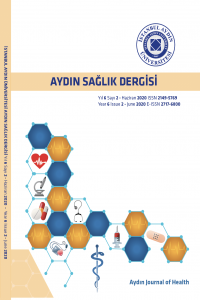Awareness and Knowledge Levels of Intensive Care Nurses about Patient Follow-Up in Intensive Care Unit
Awareness and Knowledge Levels of Intensive Care Nurses about Patient Follow-Up in Intensive Care Unit
Objective: The aim of this study was to determine the awareness and knowledge levels of intensive care nurses about patient follow-up.
Methods: This descriptive study was conducted with 87 nurses working in the intensive care units of a training and research hospital in Istanbul between 01 May and 01 June 2021. The data were collected using the "Sociodemographic Characteristics Form", "Intensive Care Nursing-Patient Follow-up Awareness Form" and "Intensive Care Nursing-Patient Follow-up Knowledge Form" prepared by the researchers.
Results: The mean age of the intensive care nurses participating in the study was 25.47±2.58 years, the average working time in the profession was 3.08±2.13 years, and the average working time in the intensive care unit was 2.25±1.58 years. The mean score of the awareness level of nurses regarding patient follow-up was 100.54±11.66, and the mean knowledge level score was 69.98±15.21. As the duration of working time in the profession and in the intensive care unit increased, the level of knowledge of the nurses about patient follow-up also increased (p<0.05).
Conclusion: Although the majority of nurses had a high level of awareness about patient follow-up in the intensive care unit, their level of knowledge was determined to be moderate. Regular theoretical and practical training programs should be organized for the elements of patient follow-up in the intensive care unit, and nurses should be encouraged to participate in certificate programs.
Keywords:
awareness, knowledge, ıntensıve care unıt, nursing care,
___
- 1.Marshall JC, Bosco L, Adhikari NK, Connolly B, Diaz JV, Dorman T, Fowler RA. What is an ıntensive care unit? A report of the task force of the world federation of societies of ıntensive and critical care medicine. J Crit Care 2017;37:270–276.
- 2. Akbal Ergün Y. Roles and responsibilities of the intensive care nurse. Durmaz Akyol A, editor. Intensive Care Nursing. İstanbul: İstanbul Medical Bookstores 2017.p.13-25.
- 3. Terzi B, Kaya N. Nursing Care of Critically Ill Patients. Journal of Intensive Care 2011;1: 21-25.
- 4. Koç Z. Roles and functions of intensive care nurses. Şahinoğlu H, editor. Intensive Care Problems and Treatments. İstanbul: Nobel Medical Bookstores 2011.p.1933-1943.
- 5. Akyol A, Kankaya H. Exploring performance obstacles of intensive care nurses. Journal of Intensive Care Nursing 2017;21(1):7-15.
- 6. Khamali RE, Mouaci A, Valera S, Cano-Chervel M, Pinglis C, Sanz C et al. Effects of a multimodal program ıncluding simulation on job strain among nurses working in ıntensive care units a randomized clinical trial. JAMA 2018;320(19):1988-1997.
- 7. Alastalo M, Salminen L, Vahlberg T, Leino-Kilpi H. Knowledge of patient observation among critical care nurses. Nurs Crit Care 2021;26(5):341-351.
- 8. Çatak PD, Ögel K. Mindfulness-based therapies and therapeutic processes. Clin Psychiatry 2010;13(1):85-91.
- 9. Çimen Düşova B, Eti Aslan F. The revıew to the awareness and the ımplementatıon mentıoned ın the law for the ıntensıve care nurses' responsıbılıtıes and dutıes: A qualıtatıve study. Journal of Intensive Care Nursing 2020;24(2):111-120.
- 10. Korkmaz E, Gür A. The retrospective analysis of intensive care nursing certified education programs. JAMER 2021:6(2);9-15.
- 11. Tiryaki Ö, Kelağalar E. Our intensive care nursing certified training program results. Journal of Intensive Care Nursing 2019;23(3):151-159.
- 12. AbuRuz ME, Hayeah HA, Al-Dweik G, Al-Akash HY. Knowledge, attitudes, and practice about evidence-based practice: A jordanian study. Health Sci J 2017;11):1-8.
- 13. Göktepe N, Türkmen E, Fener İ, Yalçın B, Sarıköse, S. The effect of nurses' individual, professional and work environment characteristics on their perception of quality of nursing care. Journal of Health and Nursing Management 2021;8(2):139-147.
- 14. Wang HL, Tsai YF. Nurses’ knowledge and barriers regarding pain management in intensive care units. J Clin Nurs 2010;19(21-22):3188-3196.
- 15. Khojastehfarb S, Ghezeljeha, T.N, Haghania S. Factors related to knowledge, attitude, and practice of nurses in intensive care unit in the area of pressure ulcer prevention: A multicenter study. J Tissue Viability 2020;29(2):76–81
- 16. Xu J, Reale C, Slagle J.M, Anders S, Shotwell M.S, Dresselhaus T, at all. Facilitated nurse medication-related event reporting to ımprove medication management quality and safety in ıntensive care units. Nurs Res 2017;66(5):337-349.
- 17. Marvanova M, Henkel PJ. Collaborating on medication errors in nursing. Clin Teach 2018;15(2):163-168. 18. Savages AR. Educational audit on drug dose calculation learning in a Tanzanian school of nursing. Afr Health Sci 2015;15(2):647-655.
- 19. Faizi F, Bahramifar A, Nir M.S, Soleymanzadeh H, Rahimi A. The effectiveness of nutrition care training program to nurses of Intensive Care Unit on patient’s nutritional consequences. Academic Journal of Health Sciences 2021;36(2):57-63.
- 20. Karimian M, Khalighi E, Salimi E, Borji M, Tarjoman A, Mahmoudi Y. The effect of educational intervention on the knowledge and attitude of intensive care nurses in the prevention of pressure ulcers. Int J Risk Saf Med 2020;31(2):89-95.
- 21. Alfieri E, Mori M, Barbui V, Sarli L. Advanced competencies mapping of critical care nursing: a qualitative research in two Intensive Care Units. Acta Biomed 2017;88(3):67-74.
- 22. De Silva AP, Stephens T, Welch J, Sigera C, De Alwis S, Athapattu P at all. Nursing intensive care skills training: A nurse led, short, structured, and practical training program, developed and tested in a resource-limited setting. J Crit Care 2015;30(2):7-11.
- 23. Erişkin Yoğun Bakım Servislerinin Asgari Donanım, Personel ve Hizmet Standartları, İstanbul İl Sağlık Müdürlüğü, 8Temmuz 2020. (Cited 2021 December 11): Available from: URL: http://www.istanbulsaglik.gov.tr/w/sb/ozeltedk/belge/8_ek_madde.pdf
- ISSN: 2149-5769
- Yayın Aralığı: Yılda 3 Sayı
- Başlangıç: 2015
- Yayıncı: İstanbul Aydın Üniversitesi
Sayıdaki Diğer Makaleler
Selection Of Establishment Location In Health Institutions
Songül HÜLAGU, Abdulkadir GÜÇLÜ
